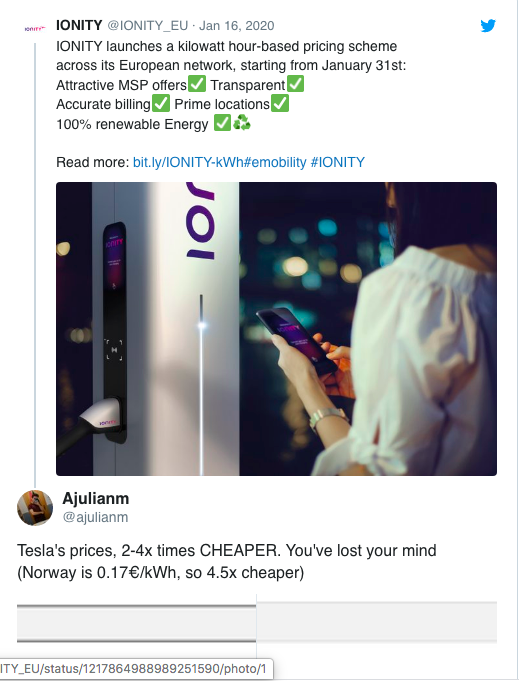Tesla’s Supercharger Network just undercut one of its biggest competitors by over three times, and the company did not even have to lower its prices. In a recent announcement, IONITY, the rapid charging network that is considered as VW, BMW, Daimler, and Ford’s answer to the Tesla Superchargers, revealed that it would be updating its pricing structure by the end of the month — and what an update it is.
In a press release, IONITY stated that it would be launching a kilowatt-hour-based pricing scheme for customers across its established pan-European network starting January 31, 2020. The new rate is simple, with the company charging customers per kWh. The only issue is that IONITY will be charging electric car drivers 0.79 EUR ($0.88) per kWh.
That’s a substantial premium compared to the Tesla Supercharging Network, which has a rate of about 0.25 EUR ($0.28) per kWh. Thus, with this new pricing structure in place, an Audi e-tron or Porsche Taycan owner would end up paying about $80 to charge the all-electric SUV from zero to 100%. Considering that these vehicles are capable of traveling just over 200 miles on a charge, IONITY’s updated prices will make long trips on electric cars far more expensive than before.
IONITY boss Michael Hajesch, for one, noted that he does not think the new pricing strategy will turn customers away from using the network. In an interview with Handelsblatt‘s EV publication Edison Media, the IONITY executive explained that the rapid charging network’s advantages would likely be worth it for electric car drivers.
“I don’t have that fear. It is important to mention that the connected mobility service providers – and in this case, also include the Porsche charging service and BMW ChargeNow – offer attractive end customer offers. Direct customers without a contract benefit from the IONITY service promise, such as high availability, a Europe-wide HPC charging network, top locations directly on the motorway, and responsible operation of the charging stations with green electricity.”
He also argued that such price adjustments would likely not deter the advent of electric mobility. While he admitted that IONITY’s new pricing is high compared to its rivals in the market, Hajesch stated that the decision to raise the network’s prices was not difficult at all, even among its owners, VW, BMW, and Daimler.
“The discussion was not fierce or difficult at all. The price will not deter customers from buying, on the contrary. The overall service promise of the European IONITY HPC network already gives an answer to the key criticisms of the past regarding availability, charging power, green electricity supply, and range anxiety. We are therefore convinced that we are making a significant contribution to the market acceptance of electromobility.
@ValueAnalyst1 @vincent13031925 @thirdrowtesla @28delayslater look at this mess, for the record it’s $0.88 /kWh.
“The purchase decision will not only depend on the IONITY price point on the long-haul route, which only accounts for five to ten percent of the annual charging needs. You also have to take into account the other use cases at home/work and public charging, which can already result in advantages over diesel and gasoline,” he said.
Despite the IONITY boss’ arguments, the fact remains that EV owners now need to pay far more to charge their vehicles using the rapid charging network. This will likely deter electric car owners who are budget conscious, and it might very well incentivize the ownership of internal combustion cars once more. After all, why buy an Audi e-tron that takes about $80 to fill up when a comparable gas or diesel-powered SUV can fill up for far less?
That being said, this update in IONITY’s pricing also highlights the practicality of Tesla’s Supercharger Network, which charges about $0.28 per kWh. Tesla’s Superchargers currently top out at 250 kW, which is less than IONITY’s peak of 350 kW, but considering the price difference, electric car owners will likely take the slightly slower charging speed and be charged a rate that is several times more affordable.
It’s unfortunate, but for now, at least, it appears that the only rapid charging network that is seriously going for petrol’s jugular is Tesla and is Superchargers.
SOURCE:Paper.li



Comentários